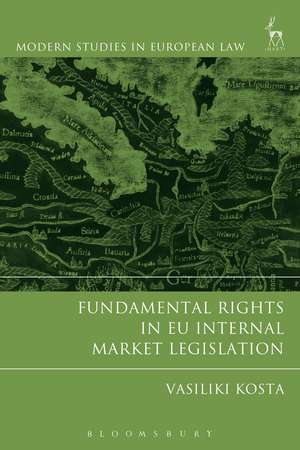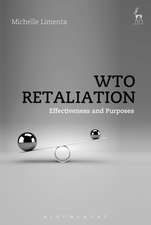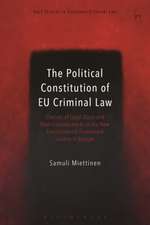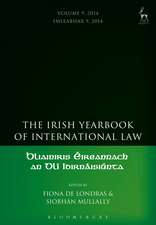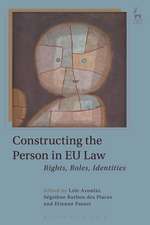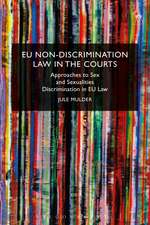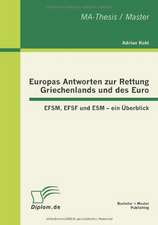Fundamental Rights in EU Internal Market Legislation: Modern Studies in European Law
Autor Vasiliki Kostaen Limba Engleză Paperback – 21 feb 2018
Din seria Modern Studies in European Law
- 19%
 Preț: 296.91 lei
Preț: 296.91 lei - 24%
 Preț: 440.21 lei
Preț: 440.21 lei - 31%
 Preț: 594.77 lei
Preț: 594.77 lei - 30%
 Preț: 570.22 lei
Preț: 570.22 lei -
 Preț: 181.55 lei
Preț: 181.55 lei - 30%
 Preț: 790.77 lei
Preț: 790.77 lei - 30%
 Preț: 507.97 lei
Preț: 507.97 lei - 30%
 Preț: 541.93 lei
Preț: 541.93 lei - 34%
 Preț: 509.45 lei
Preț: 509.45 lei - 30%
 Preț: 511.64 lei
Preț: 511.64 lei - 30%
 Preț: 721.14 lei
Preț: 721.14 lei - 30%
 Preț: 571.34 lei
Preț: 571.34 lei - 27%
 Preț: 475.10 lei
Preț: 475.10 lei - 30%
 Preț: 572.80 lei
Preț: 572.80 lei - 23%
 Preț: 418.50 lei
Preț: 418.50 lei - 11%
 Preț: 375.73 lei
Preț: 375.73 lei - 30%
 Preț: 575.75 lei
Preț: 575.75 lei - 19%
 Preț: 317.21 lei
Preț: 317.21 lei - 19%
 Preț: 296.72 lei
Preț: 296.72 lei - 18%
 Preț: 320.53 lei
Preț: 320.53 lei - 18%
 Preț: 321.66 lei
Preț: 321.66 lei - 30%
 Preț: 600.57 lei
Preț: 600.57 lei - 30%
 Preț: 512.22 lei
Preț: 512.22 lei - 30%
 Preț: 571.34 lei
Preț: 571.34 lei -
 Preț: 464.01 lei
Preț: 464.01 lei -
 Preț: 239.78 lei
Preț: 239.78 lei - 30%
 Preț: 538.03 lei
Preț: 538.03 lei - 30%
 Preț: 539.57 lei
Preț: 539.57 lei - 30%
 Preț: 595.65 lei
Preț: 595.65 lei - 30%
 Preț: 571.66 lei
Preț: 571.66 lei - 29%
 Preț: 587.97 lei
Preț: 587.97 lei - 30%
 Preț: 774.62 lei
Preț: 774.62 lei - 30%
 Preț: 570.43 lei
Preț: 570.43 lei - 30%
 Preț: 574.10 lei
Preț: 574.10 lei - 28%
 Preț: 495.80 lei
Preț: 495.80 lei - 30%
 Preț: 575.33 lei
Preț: 575.33 lei - 30%
 Preț: 571.24 lei
Preț: 571.24 lei - 30%
 Preț: 510.34 lei
Preț: 510.34 lei - 20%
 Preț: 219.19 lei
Preț: 219.19 lei - 30%
 Preț: 601.69 lei
Preț: 601.69 lei - 30%
 Preț: 513.60 lei
Preț: 513.60 lei - 18%
 Preț: 305.72 lei
Preț: 305.72 lei - 30%
 Preț: 972.83 lei
Preț: 972.83 lei - 30%
 Preț: 515.24 lei
Preț: 515.24 lei - 30%
 Preț: 539.99 lei
Preț: 539.99 lei - 30%
 Preț: 570.83 lei
Preț: 570.83 lei - 30%
 Preț: 571.82 lei
Preț: 571.82 lei - 29%
 Preț: 554.35 lei
Preț: 554.35 lei - 30%
 Preț: 572.06 lei
Preț: 572.06 lei
Preț: 269.05 lei
Preț vechi: 305.52 lei
-12% Nou
Puncte Express: 404
Preț estimativ în valută:
51.49€ • 54.14$ • 42.54£
51.49€ • 54.14$ • 42.54£
Carte tipărită la comandă
Livrare economică 17 aprilie-01 mai
Preluare comenzi: 021 569.72.76
Specificații
ISBN-13: 9781509920006
ISBN-10: 1509920005
Pagini: 384
Dimensiuni: 169 x 244 x 26 mm
Greutate: 0.61 kg
Ediția:NIPPOD
Editura: Bloomsbury Publishing
Colecția Hart Publishing
Seria Modern Studies in European Law
Locul publicării:London, United Kingdom
ISBN-10: 1509920005
Pagini: 384
Dimensiuni: 169 x 244 x 26 mm
Greutate: 0.61 kg
Ediția:NIPPOD
Editura: Bloomsbury Publishing
Colecția Hart Publishing
Seria Modern Studies in European Law
Locul publicării:London, United Kingdom
Caracteristici
This book attempts to systematise the present interrelationship between fundamental rights and the EU internal market in the field of positive integration.
Notă biografică
Vasiliki Kosta is Assistant Professor of European Law at Leiden University.
Cuprins
1. Introduction 1I. Setting the Scene: A Fundamental Rights Policy in the Internal Market ? II. Methodology III. Analysis IV. Conclusion 2. Competence I. Introduction II. Harmonising Fundamental Rights Under Article 114 TFEU III. Conclusion 3. New Mechanisms for Fundamental Rights Protection in EU Legislation: Building a Fundamental Rights Culture Outside the Courts I. Introduction II. Evolution III. The Fundamental Rights Scrutiny Tools in Detail IV. Conclusion 4. Data Protection I. Introduction II. Data Protection as a Fundamental Right III. Regulating Data Protection: The Data Protection Directive and the e-Privacy Directive IV. Regulating Restrictions to Data Protection: The (Invalidated) Data Retention Directive 2006/24/EC V. Proposal for a Coherent Data Protection Framework for the Twenty-First Century: Moving Away from theInternal Market, Moving Closer to Autonomy? VI. Conclusions 5. Freedom of Expression I. Introduction II. Media Pluralism- How the Regulatory Process Can Fail III. The Audiovisual Media Services Directive - Promoting Freedom of Expression/to Provide Services IV. Regulating Commercial Expression in the Internal Market C. Conclusion 6. Fundamental Labour Rights I. Introduction II. The Right to Fair and Just Working Conditions in the Posted Workers Directive 96/71/EC III. The Right to Take Collective Action and its Reconciliation with Economic Freedoms IV. Final Conclusion 7. Health I. Introduction II. Public Health versus Health as a Fundamental Human Right III. Market - Health Harmonisation Practice and the Role of Fundamental Rights IV. Conclusion 8. Conclusions I. Harmonising Fundamental Rights Protection Through the Internal Market II. Existing Harmonisation Practice III. Final Conclusion: Don't Judge a Book by its Cover IV. Epilogue
Recenzii
In a highly concrete manner, the author makes an in-depth analysis of the practices of harmonisation and legislative activity in the domains of greatest importance in terms of their impact on human life...
Anyone interested in this important aspect of EU human rights law should read this book, which is replete with thought-provoking reflections on the role of EU legislation and the value of spelling out its human rights implications, as well as detailed analysis of the four substantive fields considered.
This piece of work breaks ground in an unexplored area of the law. This book belongs in the libraries of EU policy-makers, organisations devoted to the promotion of fundamental rights, and anyone with an interest in fundamental rights in the EU, particularly as regards data protection, freedom of expression, social rights and health policy.
Anyone interested in this important aspect of EU human rights law should read this book, which is replete with thought-provoking reflections on the role of EU legislation and the value of spelling out its human rights implications, as well as detailed analysis of the four substantive fields considered.
This piece of work breaks ground in an unexplored area of the law. This book belongs in the libraries of EU policy-makers, organisations devoted to the promotion of fundamental rights, and anyone with an interest in fundamental rights in the EU, particularly as regards data protection, freedom of expression, social rights and health policy.
